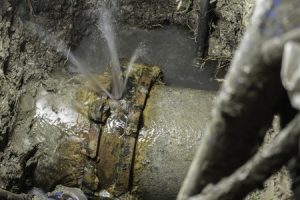
Before the drought, wasting water was rarely mentioned; now it’s a constant topic. The subject will remain in the forefront because our population has reached the size where sustainability is a genuine concern. What constitutes waste and what can be done to conserve the available supply?
The simplest way to define waste is to say, “If I need to use water, the use is not a waste. If the other guy uses water in a manner I disagree with, his use is a waste of water.” The definition depends on who is doing the talking. For people who don’t golf, watering a golf course is a waste of water, but golfers will always disagree.
The Oakdale Irrigation District (OID) appears to define waste, in part, as any use of its water rights that it can’t monetize. For OID, water sent down a river for fish habitat or to keep up water quality in the Delta is considered waste. The Bureau of Reclamation and conservationists argue that providing habitat for fish and maintaining Delta water quality are not a wasteful but necessary uses of water.
For the City of Modesto, watering landscapes, washing cars at home, and washing off concrete walkways are now considered wasteful water uses. Hence, residents are allowed to water only twice a week. Even though their water has been monetized, the mandate to conserve overrides citizen discretion to enjoy water.
Most city dwellers think that farmers waste a great deal of water, using much more than they need to grow crops or raise cattle. Some people think that growing crops in a desert is a waste of water. Farmers undoubtedly have a list of water wasting practices performed by city dwellers.
An Honest Definition of Water Waste
When water is abundant, everyone probably wastes water in some manner. When we use more water than we need to accomplish an objective, we are wasting it. The problem is in knowing exactly how much water we need for a given task.
Water conservation studies and education can help citizens determine how much water they truly need. A direct correlation exists between the cost of water and the willingness to conserve. As the cost goes up, conservation increases, except where the user is so wealthy that the cost seems insignificant.
Suggestions on how to conserve water are widely available online and routinely published by water companies. Waste can be minimized by learning and implementing published conservation practices.
For example, people can easily be taught that fixing leaking toilets and pipes would save a lot of water in any community. Cities and water companies can save a lot of water by properly maintaining the delivery system.
To minimize waste of water, most subsidies would need to be eliminated. While subsidies encourage desirable social behavior, they also encourage economic activities that might not normally be cost effective.
A Harmful Subsidy
For many years, the Westlands Water District has received substantial subsidies both in the form of publicly-financed water infrastructure and in the cost of water delivered to the area. Had farmers in the district paid the full value of the water and infrastructure, land in the area might have been used differently. Perhaps, more drought-tolerant crops might have been planted instead of nut trees. Some land that never should have been farmed might have remained fallow.
Now, very little water is available for farmers in the area to use. As a consequence of past decisions, the farmers of Westlands now have great difficulty buying sufficient water to produce a profitable crop and many may end up going out of business, returning the landscape in the area to the desert it once was.
The Ultimate Savings
Water recycling is an idea whose time has come. Substantial research and experimentation have proven that water can be recycled in a cost effective manner. When water is reused, a perpetual supply can be generated. Water waste is minimized because any water that is used can be reused, regardless of whether the original use was effective.
Forms of recycling exist naturally. Water evaporates and falls as rain elsewhere. Excess water that is used for landscaping seeps into the ground and can be reused when it is pumped as groundwater.
If man-made systems for recycling water continue to be created, even more water will be available. Perhaps one day, water shortages will only exist in history.
